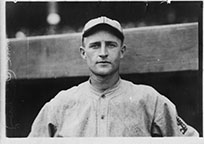March 15, 1915 Age 24
The St Louis Star and Times
HOT WELLS, TEX., March 15. One of the most likable chaps in the Cardinal camp is Harry Glenn, the big recruit backstop, who was farmed out to the St. Paul club last spring and recalled last fall.
Glenn was Bill Doak’s battery mate in the defunct Interstate League in 1913 and was picked up by Scout Eddie Herr along with Doak shortly before the Interstate League blew up in August, 1912.
Doak and Glenn were members of the Akron, Ohio, club and both were instructed to report to the Cardinals the day the Interstate circuit disbanded.
Glenn broke his right leg just above the ankle while tagging a runner at the plate during the last game of the 1913 season and was taken to a hospital that night, while Doak was en route for St. Louis.
The injured prop was so slow in healing that Glenn was in very poor shape when he reported to Manager Huggins at St. Augustine last spring. His inability to get into condition caused Huggins to farm him out to St. Paul and he performed so well for Mike Kelly’s club last season that the Cardinal pilot deemed it advisable to recall him.
Glenn seems to be in excellent physical condition now and if Scout Eddie Herr’s predictions of two years ago can still be considered effective, the big Shelburn, Ind., youngster is going to make a strong bid for retention this season.
Editor’s Note
Harry Melville “Husky” Glenn (June 9, 1890 – October 12, 1918) was a professional baseball player from 1910 to 1918. He played six games of the 1915 season in Major League Baseball as a catcher for the St. Louis Cardinals.[1] He also played eight seasons in the minor leagues including five seasons with the St. Paul Saints from 1914 to 1918.[2][3]
Glenn was born in Shelburn, Indiana, in 1890.[1] He was drafted to serve in the military in August 1918. He served in the U.S. Army Signal Corps where he began training as an aviation mechanic in St. Paul, Minnesota. He developed pneumonia and died in a St. Paul Hospital in October 1918.[4][5] He is buried in Highland Lawn Cemetery, Terre Haute, Indiana.[6]
Glenn was one of eight Major League Baseball players known either to have been killed or died from illness while serving in the armed forces during World War I. (from https://en.wikipedia.org/wiki/Harry_Glenn)
